SIOS offers funded access to research infrastructure owned by our members in and around Svalbard. The infrastructure available in the 2020 call is described below.
We encourage applicants to make contact with the access provider (contact details below) to discuss the requirements of their project before submitting their application. Questions may also be directed to the SIOS Observing Network Infrastructure Officer.
When contacting the access provider, please include, as a minimum, the following information:
- Your name and affiliation.
- The number of people in your group.
- Details of your planned fieldwork (dates, location, type of environment, type of work). Please be as specific as possible.
- The needs of your project, in terms of access, logistical support, equipment, data, other support from staff at the facility.
- The level of experience and needs for safety training for the members of the group.
Hornsund
One room for 4 persons (including meals) is available to SIOS projects at the Stanisław Siedlecki Polish Polar Station throughout the year. The station is run by the Institute of Geophysics of the Polish Academy of Sciences.
See here (pdf), the station website and the entry in European Polar Infrastructure Database for more details about the station.
Contact person: Station Manager - Włodzimierz Sielski (sielski@igf.edu.pl)
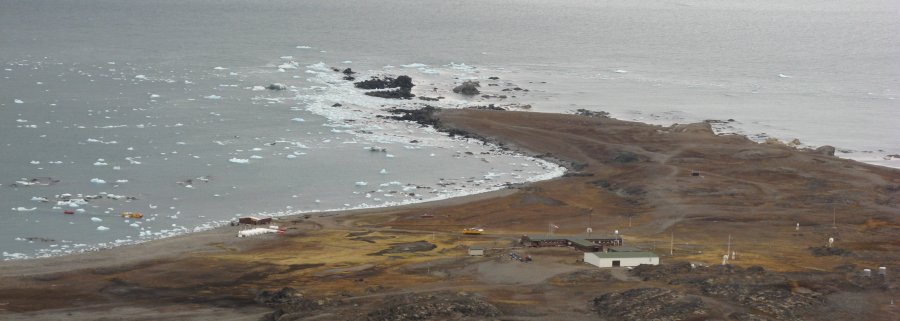
Hopen and Bear Island
One person can be accommodated at Hopen, and 2 people at Bear Island, for 1-2 weeks. Please write to Thomas Olsen (contact details below) before applying, to check available dates.
The person(s) have to arrange and pay for transport themselves (but the Norwegian Meteorological Institute can give relevant information/guidance). Travel funding of up to 15 000 NOK is available from SIOS. It is not possible to offer a separate office or a lab, but there is space for equipment of reasonable size.
The Norwegian Meteorological Institute facilitates external institutions' needs for research related equipment and support on the islands. Cost recovery for electricity, Internet connection, accommodation and man-hours for practical support is agreed for each case.
More details about Hopen: http://hopenmeteo.no/ and Bear Island: http://bjornoya.org/. See also entry in European Polar Infrastructure Database for Hopen and Bear Island.
Contact person: Thomas Olsen (thomas.olsen@met.no)
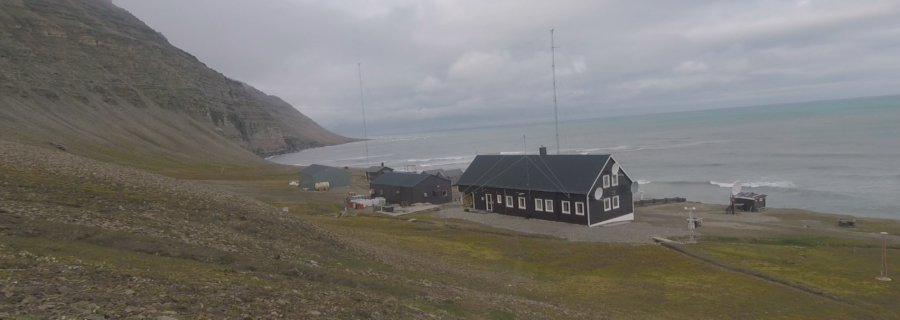
Ny-Ålesund Research Station
Ny-Ålesund is a unique station for Arctic research and monitoring of environmental change. Access to facilitites in Ny-Ålesund is offered by the Alfred Wegener Institute, the National Research Council of Italy and the Norwegian Polar Institute. Access to the Zeppelin Observatory is managed jointly by the Norwegian Polar Institute, the Norwegian Institute for Air Research and Stockholm University. You can find information about the research station as a whole in the Researchers Guide to Ny-Ålesund.
Facilities offering access in Ny-Ålesund:
- AWIPEV
-
- On site access to the observatories: Access to the observatory facilities in Ny-Ålesund can be made available for joined observational programmes with the respective PIs. We recommend that potential applicants contact Observatory PIs before submission of applications through Scientific Coordinator Marion Maturilli (contact details below).
- For more details about the station see the European Polar Infrastructure Database and https://www.awipev.eu/
- Contact person: Marion Maturilli (marion.maturilli@awi.de)
- Dirigible Italia
-
- Access limited to not more than 2 people per project per period
- Length of stay flexible (up to 60 person days in total)
- Reduced capacity April / early May and June / July, but access may still be possible during these times.
- Access to data from observatories (more information here)
- For more details about the station see here , https://www.isp.cnr.it/index.php/en/infrastructures/research-stations/dirigibile-italia and European Polar Infrastructure Database.
- Contact person: Mauro Mazzola (mauro.mazzola@cnr.it) with Angelo Viola (angelopietro.viola@cnr.it) on copy.
- Sverdrup (Norwegian Polar Institute)
-
- General access to Ny-Ålesund. NPI can host research groups for projects in 2023 to Sverdrup. This includes accommodation, board, and access to facilities like office space and field equipment. We can also offer boat transport services.
- For more details see information about Sverdrup on the NPI website, in the European Polar Infrastructure Database and in the Researchers Guide to Ny-Ålesund.
- The budget must include the additional costs for the required field equipment and field support. Pricelist Varekatalogen.
- On-site access to the Zeppelin Observatory
- World-class observatory for atmospheric measurements. See more information about the observatory here: https://www.npolar.no/en/zeppelin/
- Only applications pre-approved by the joint House-committee of NPI, NILU and SU in advance of submitting an application to SIOS will be considered. If you consider applying for access to Zeppelin, you must complete the Registration form on the webpage and be in touch with Rune Jensen (headnpi.nya@npolar.no) in due time before the application deadline.
- The budget must include the additional costs for accessing Zeppelin (pricelist available from contact person)
- Contact person: Rune Jensen (headnpi.nya@npolar.no) or Christina Pedersen (christina.pedersen@npolar.no)
- Kings Bay AS
-
- Access to all Kings Bay infrastructure in Ny-Ålesund. Access include flights, harbour, housing, meals, rooms, refreshments, freight, storage and rent of snowmobiles, and other services as transport, equipment as well as help with sampling and fieldwork.
- Access to Kings Bay Marine laboratory, Kings Bay Veksthus, Gruvebadet and the light sensitive cabin
- For more information see https://kingsbay.no/
- Contact person: Ingrid Rekkavik (adviser@kingsbay.no)
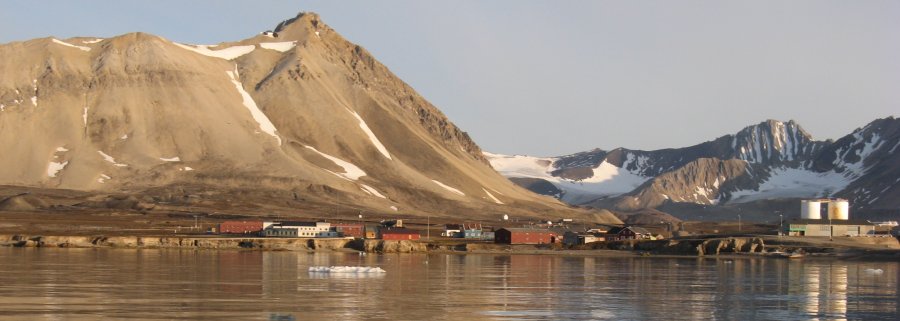
Longyearbyen - Svalbard Science Centre
The Norwegian Polar Institute offers logistical services for fieldwork across the Arctic from its office in Longyearbyen. It is possible to rent equipment, but there is no access offered to offices, labs or warehouses.
- For more details see https://www.npolar.no/en/logistics/
- Contact person: Geir Ove Aspnes (geir.ove.aspnes@npolar.no)
For more details about Svalbard Science Centre see the European Polar Infrastructure Database.
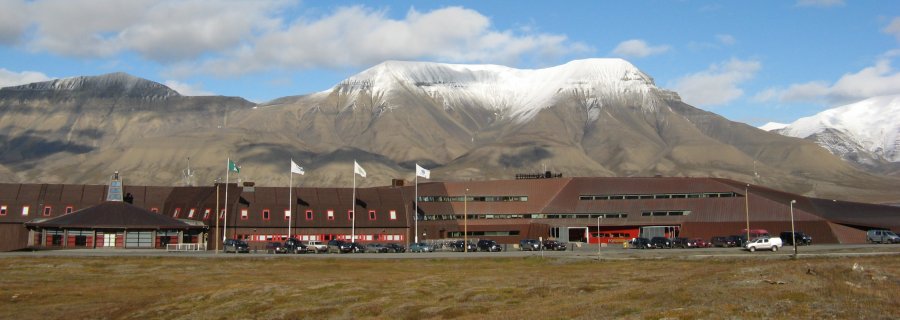
Airborne remote sensing platforms
SIOS, in cooperation with NORCE, is pleased to offer access to airborne remote sensing platforms (aircraft and drones) for research purposes. The technical and operational details of the available airborne platforms are available from the contact person, Rune Storvold.
Contact person: Rune Storvold (rust@norceresearch.no)
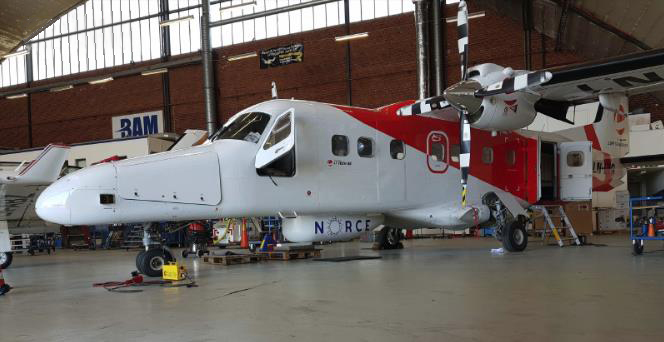
Photo: Rune Storvold
Ocean Glider
The University of Bergen offers access to an ocean glider (1000-m rated) for limited missions that can be supported within the access call budget. The ocean glider is coordinated and operated by the Norwegian National Facility for Ocean Gliders (NorGliders https://norgliders.gfi.uib.no) at the Geophysical Institute, University of Bergen. The operation area of the glider is the ocean area west of Spitsbergen and Isfjorden, and must be in open waters at safe distance from sea ice. The user is expected to facilitate deployment and recovery opportunities for the mission.
Contact person: Ilker Fer (ilker.fer@uib.no)



























